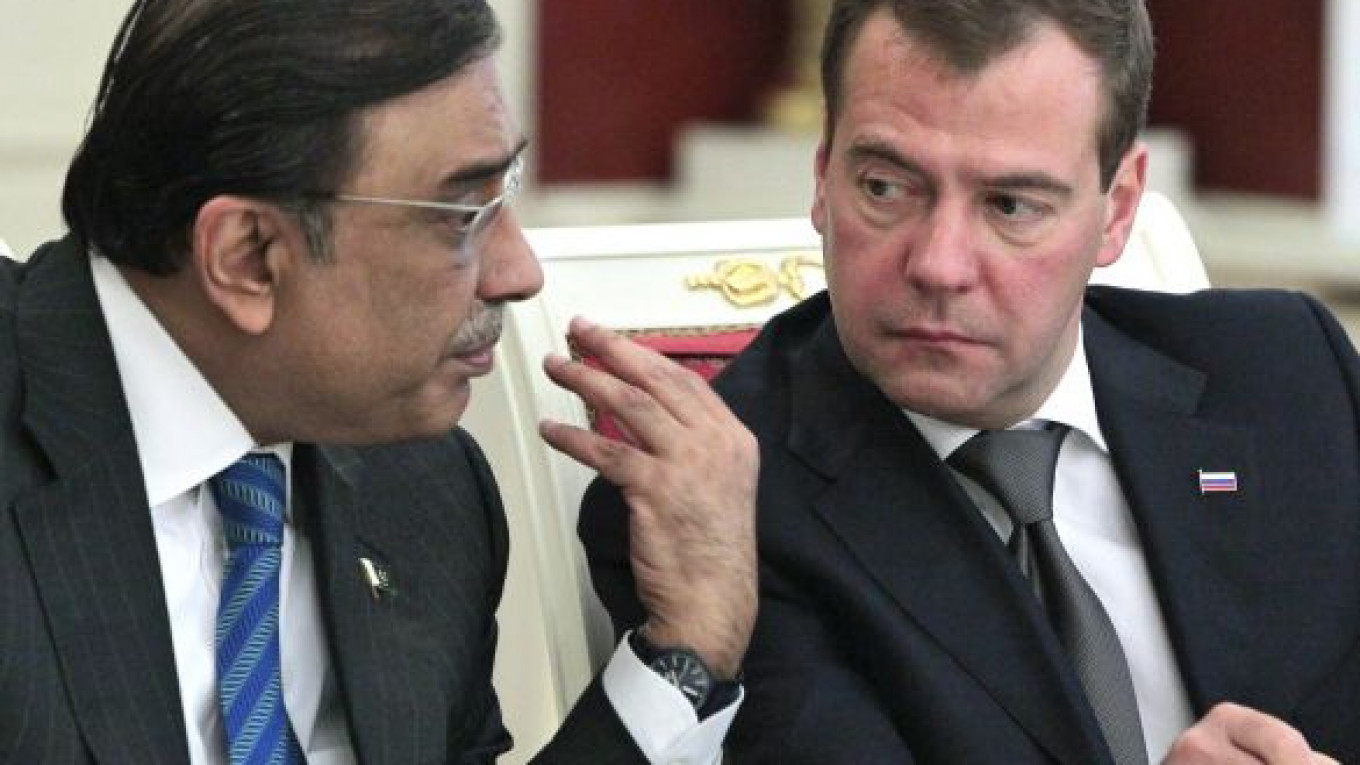Gazprom is ready to help develop resources in Pakistan, the Kremlin said in a statement after President Dmitry Medvedev met with his Pakistani counterpart Asif Ali Zardari in the Kremlin on Thursday.
Other agreements signed during the meeting include an intergovernmental agreement on air traffic, a memorandum of mutual understanding between the Russian Energy Ministry and the Pakistani Ministry of Petroleum and Natural Resources, and a memorandum of mutual understanding between the Russian Agriculture Ministry and the Pakistani Ministry of Food and Agriculture.
Russia is also looking for a role in the construction of a gas pipeline from Turkmenistan to India, via Afghanistan and Pakistan, according to the statement.
Both sides confirmed sincere interest in joint work on the CASA 100 project of electric power transmission from Tajikistan to Afghanistan and Pakistan. Russia's Inter RAO, the state-run power utility, is also looking to build generators in Pakistan, the Kremlin said. Modernization by Russia of a steel plant in Karachi was also discussed.
The Pakistani president supported Russia's participation in the projects and called for their soonest implementation.
The leaders also pledged to work together to fight terrorism and prevent drug trafficking in Central and Southern Asia.
Zardari's visit is his first major foreign trip since Osama bin Laden was killed in Pakistan earlier this month.
In the wake of bin Laden's killing, his unpopular government faced criticism from the United States, where some politicians accused Pakistani authorities of helping the world's most wanted terrorist.
Medvedev and Zardari also discussed the turbulent situation in Afghanistan, and said they supported efforts aimed at reaching national reconciliation in that country.
The two leaders expressed "serious concerns" about the continuing terrorist threats and drug trafficking in the region.
The Pakistani delegation included Defense Minister Chaudhry Ahmed Mukhtar, Prime Minister's Adviser Asim Hussain and State Minister for Foreign and Economic Affairs and Finance Hina Rabbani Khar.
Meanwhile, Pakistan's Prime Minister Yusuf Raza Gilani opened the country's second Chinese-made nuclear power reactor on Thursday, praising "unwavering" support from its long-time ally as Pakistan faces pressure over the discovery of Osama bin Laden.
China, Pakistan's most steadfast ally since its independence from Britain in 1947, has already helped Pakistan build one nuclear power facility in Chashma, in Punjab province.
(Interfax, Bloomberg, AP, Reuters)
Iran's Russian-built Bushehr nuclear power plant will be fully operational within weeks, local news agencies quoted a senior Russian diplomat as saying on Thursday.
Deputy Foreign Minister Sergei Ryabkov also said the six global powers seeking to ensure that Iran does not develop nuclear weapons should affirm they are ready for fresh contacts with Tehran on its atomic program, according to the reports.
Ryabkov spoke two days after the Russian state company that built the Bushehr plant, a politically charged project that has run into many delays, said the reactor had begun operating at a low level for tests before it is brought online.
"The final launch of Bushehr is a matter of the coming weeks," state-run RIA-Novosti quoted Ryabkov as saying.
A Message from The Moscow Times:
Dear readers,
We are facing unprecedented challenges. Russia's Prosecutor General's Office has designated The Moscow Times as an "undesirable" organization, criminalizing our work and putting our staff at risk of prosecution. This follows our earlier unjust labeling as a "foreign agent."
These actions are direct attempts to silence independent journalism in Russia. The authorities claim our work "discredits the decisions of the Russian leadership." We see things differently: we strive to provide accurate, unbiased reporting on Russia.
We, the journalists of The Moscow Times, refuse to be silenced. But to continue our work, we need your help.
Your support, no matter how small, makes a world of difference. If you can, please support us monthly starting from just $2. It's quick to set up, and every contribution makes a significant impact.
By supporting The Moscow Times, you're defending open, independent journalism in the face of repression. Thank you for standing with us.
Remind me later.






